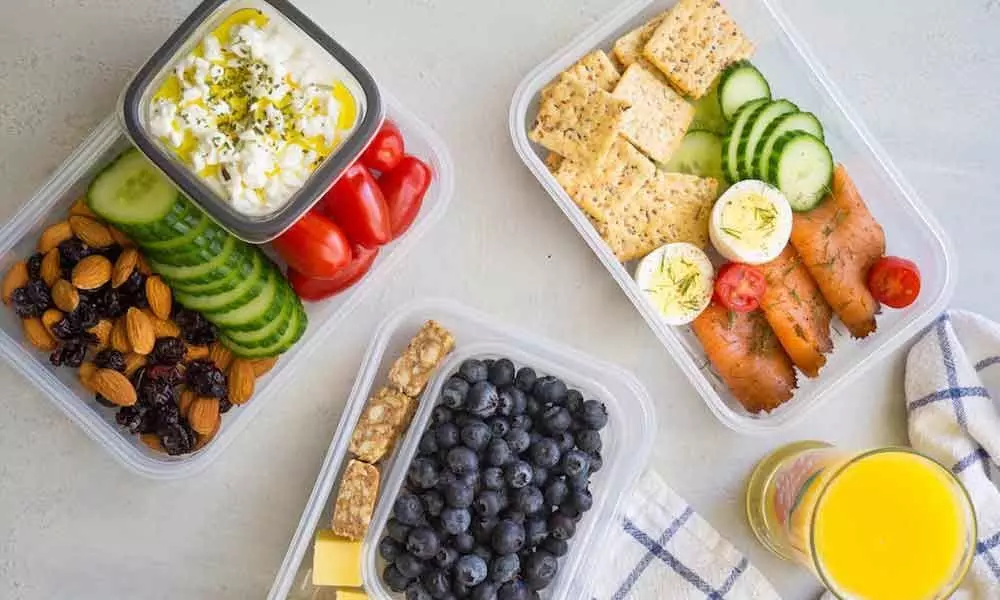Foods to Avoid before served on plates

Want to know what the experts avoid? Here's the list of foods, processed goods, ingredients, and chemicals that nutritionists won't put on their plates.
Artificial sweeteners
A grande iced coffee with skim milk and two Splendas, please? Think again—and hold the sweet stuff. "I do not think there is sufficient evidence to prove that most artificial sweeteners are safe for consumers. I prefer to stay away from them and indulge in the real thing [sugar] occasionally and mindfully. Plus, there's a plethora of research that shows how consuming diet beverages may counter-intuitively lead to weight gain, which can increase your risk of chronic diseases like diabetes and heart disease," nutritionist
Microwave Popcorn
Love to curl up in front of The Voice with some vino and a buttery bag of popcorn? Resist. "I once ripped open an unpopped microwave popcorn bag and I haven't eaten it since! There are too many artificial chemicals used in the flavourings inside the microwavable bag. I prefer to avoid overly processed products like this as much as possible," Amer explains. Make your own with popcorn kernels, a brown paper bag and olive oil with a touch of salt.
Processed deli meats
It's super-easy to make a turkey club when you buy deli meats in bulk on Sunday for your meal prep. But there may be some dangerous ingredients lurking in those slices. "Processed deli meats can contain a wide variety of additives from nitrates to carrageenan that can increase inflammation in the body and have even been scientifically linked to increased risk in colon cancer,"
Reduced-fat peanut butter
You're better off going full fat. "Regular and reduced-fat peanut butter contain roughly the same amount of calories. But the reduced-fat varieties typically contain more added sugar or artificial sweeteners to improve the taste," says Faletra. "The fat found in peanut butter is healthy for our bodies, so stick to the natural full-fat peanut butter."
Margarine
If the dairy-free life isn't for you but you're a waistline watcher, you might reach for the "healthier" margarine. Hold that thought: "Most margarine rely primarily on highly processed vegetable oils (particularly soybean and palm oil)," Faletra says. "Choosing grass-fed organic butter in moderation is a much better option for our health as these butter contain high-levels of heart-healthy omega-3 fatty acids."
Frozen meals
While nutritionist Ha Nguyen, RDN, used to nom on frozen meals as a kid—nearly every day after high school. Today, she wouldn't touch one with a 10-foot pole. Why? "Most prepackaged frozen meals are overly processed, made with refined flour, high in sodium, and full of additives and preservatives. All things that are not good for your body" says, Nguyen. Learn to recognize the most harmful ingredients in processed food.
Pop-tarts
You might remember these commercials when you were in middle or high school. Maybe you even argued with your pals over which flavour was the best. But Nguyen recommends keeping 'em out of your shopping cart. "You might as well send your kid off to school with a candy bar for breakfast. If you simply look at the first few ingredients they consist of refined sugars including corn syrup, high fructose corn syrup, dextrose, and sugar," Nguyen says. Opt for these healthier breakfast ideas instead.
Cheese in a Can
Though arguably super fun to play with when you're 16, as far as a nutritional value, there's not much this canned faux-dairy can offer you. "Cheese spread is highly processed with very little actual 'cheese' in it," says nutritionist Michelle Jaelin, RD. It comes with a laundry list of artificial ingredients and colours that I don't feel comfortable eating. It is called plastic cheese for a reason! If I want to eat cheese, I eat the real thing," says.
Boutique juices
Three bottles of juice: one red, one green and one orange
While that carton might claim to give you the vitamins and minerals you need, nutritionist Andy De Santis, RD, says fruit juices—even the boutique ones—are a slippery slope. "The alarming trend of expensive juices is concerning. These products are generally packed in calories and they won't keep you feeling full or provide anywhere near the full nutritional benefit of eating whole fruits and veggies," he says. "For reference, eating an apple, orange and banana would take me 10 minutes. Drinking them in a juice—maybe 10 seconds?" That's a lot of calories in less than a minute.
Sausages
Fresh Greasy Hot Dogs
Take yourself out to the ball game, but skip the hot dog. You might be better off with a brewski and a bag of peanuts. "Not only are hot dogs high in fat and relatively low in protein, which is the exact combination you don't want in your meat, but they are generally chock-full of sodium, which none of us needs more of," De Santis says. "The icing on the cake? There is a growing body of evidence that connects eating processed meats with an increased risk of cancer in the digestive tract." These are the clear signs you're eating too much salt.
Cheese
Say it isn't so! While everything in moderation is a good rule of thumb for almost anything, De Santis put cheese on the naughty list because there are better ways to get calcium. "Cheese is generally high in calories, saturated fat, and sodium, all of which we need to cut back on. You are better off with low-fat milk, soy or almond alternative, or vitamin D-fortified yoghurt. Don't forget that nuts, seeds, legumes and dark leafy greens also contain calcium."










